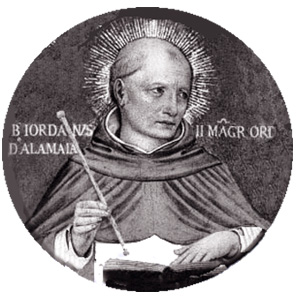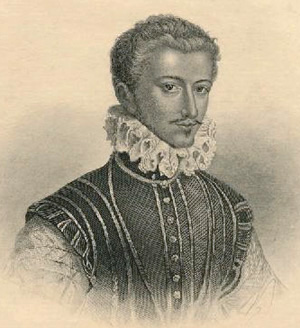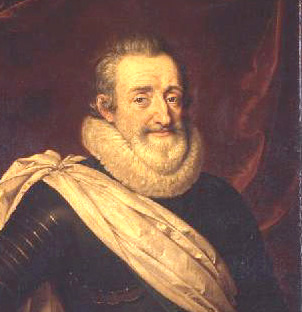 |
The Saint of the Day
Blessed Jordan of Saxony – February 15
Prof. Plinio Corrêa de Oliveira
Biographical selection:
Blessed Jordan of Saxony (1190-1237) was the second general of the Order of Preachers, the immediate successor of St. Dominic.

Blessed Jordan of Saxony,
second superiorof the Dominicans
|
One day he asked to be received by the Emperor of the Holy Roman German Empire, Frederic II, who persecuted the Church. When he entered, the Emperor invited him to sit, but did not address a word to him.
After a long silence, Blessed Jordan said: “I am amazed that after having traveled through diverse provinces in fulfilling my mission, you have nothing to inquire of me.”
The Emperor replied: “I have my emissaries in all the courts and provinces, and I know everything that happens in the world.”
Jordan answered: “As God, Jesus Christ knew everything; notwithstanding, He asked His disciples what was being said about Him. You are but a man, and you ignore what people are saying about you. However, it would be good for you to know such things, for it is said that you have oppressed the churches, scorned the ecclesiastical censures, believed in superstitions, favored Jews and Saracens, and refused to honor the Pope, Vicar of Jesus Christ. Certainly this is not worthy of an Emperor.”
After saying this, he stood and left the room.
Comments of Prof. Plinio:
We should note that in the Middle Ages these accusations could justify a process of deposition of the Emperor. Therefore the fact that Blessed Jordan, Superior of the already powerful Dominican Order, requested an interview and said these words to Frederic II included an implicit threat.
At that time there was a serious discussion about the rights of the Church over the Empire.
On one hand, a bad current supported that the Emperor could not be deposed by the Pope for reason of heresy, because the State is a temporal entity and heresy is a religious crime. So, there would be no basis for a religious authority to depose someone with supreme temporal authority, such as an Emperor or a King. We see that the bad doctrine of separation of Church and State was already included in this position. All of modern Laicism was implied in it as well.

Henri, Duke of Guise, was the leader of the Catholic League
|
On the other hand, a good current upheld that the supreme temporal authority – an Emperor or a King – is the representative of God for the people over which he reigns, and therefore, subject to the Vicar of Jesus Christ on Earth, the Pope. Consequently, the Emperor and Kings should not only serve the Church and assist her, but should also combat heresy and the enemies of the Church. Further, they should organize the temporal order in a way to favor the salvation of souls. One effect of this doctrine is that a heretic cannot hold the supreme temporal authority in a country as King, or in an ensemble of countries as Emperor.
The application of this doctrine gave rise to one of the good movements that appeared in France after the beginning of the Revolution, which was the Catholic League. A counter-revolutionary movement against Protestantism, it was the precursor to the Chouanerie, which countered the French Revolution.
The Catholic League was organized by the Guise family and opposed the ascension of Henry of Navarre, a Protestant, to the throne of France. Henry of Navarre was a member of the Bourbon family with many Protestant members and a general sympathy for Protestantism. He had legitimate rights to the throne, but the League forbade him to ascend to it because he was Protestant. The Guise family defended the principle that France should annul the right of the Protestant Bourbons to the throne and convene the Estates General to choose another dynasty to reign over France.

Henry IV of Bourbon made an opportunist conversion to assume the throne of France
|
Unfortunately, an accord was reached in which the Bourbons made a conversion of convenience, and Henry of Navarre became King Henry IV of France. The Bourbons ascended to the throne of France, making many concessions to Protestantism, and History took a course that could have been different. The principle behind the Guise party’s opposition to Henry of Navarre was that a heretic does not have the right to exert the supreme authority of a State.
The same should apply to the Holy Empire. It was holy because it was born from the blessing of the Church; it was an ecclesiastic institution. So, everyone understood that the Pope had the right to depose the Emperor should he adhere to a heresy, persecute the Church, or unduly intervene in ecclesiastical affairs. This was based upon the well-known precedent of Pope St. Gregory VII deposing Emperor Henry IV.
Therefore, the accusations of Blessed Jordan of Saxony were a clear threat against Frederic II. Indeed they were not futile, for Pope Gregory IX would excommunicate Frederic II a short time later, in 1228.
The attitude of Blessed Jordan facing the Emperor was proof of a mammoth courage. The Emperor of the Holy Roman German Empire was the highest temporal authority on earth. All the kings and powerful men of the world were under him in authority. Protocol called for the German sovereign Princes to bend their knees before him. No one had the courage to tell the truth to him.
Presidents of Republics in our days are much less powerful than the monarchs of old. But even though a President does not exert the supreme power of a country, it is rare to find a person who has the courage to ask an interview of a President in order to tell him straightforwardly his wrongdoings, then stand up and leave the room. In this episode, Blessed Jordan revealed that he was a man of true courage and strong faith.
Let us ask Blessed Jordan of Saxony to obtain for us his faith and courage and give the world and the Catholic Church courageous men and saints in his mold.


  |
|
Prof. Plinio Corrêa de Oliveira | |
The Saint of the Day features highlights from the lives of saints based on comments made by the late Prof. Plinio Corrêa de Oliveira. Following the example of St. John Bosco who used to make similar talks for the boys of his College, each evening it was Prof. Plinio’s custom to make a short commentary on the lives of the next day’s saint in a meeting for youth in order to encourage them in the practice of virtue and love for the Catholic Church. TIA thought that its readers could profit from these valuable commentaries.
The texts of both the biographical data and the comments come from personal notes taken by Atila S. Guimarães from 1964 to 1995. Given the fact that the source is a personal notebook, it is possible that at times the biographic notes transcribed here will not rigorously follow the original text read by Prof. Plinio. The commentaries have also been adapted and translated for TIA’s site.
|
Saint of the Day | Home | Books | CDs | Search | Contact Us | Donate

© 2002- Tradition in Action, Inc. All Rights Reserved
|
 |

|